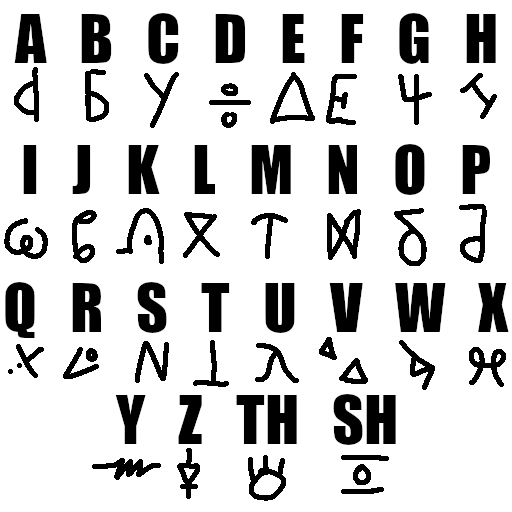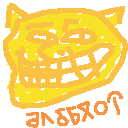I've recently restarted development on one of my projects, Squonker, which shall remain un-announced generally until there's some, well, game to show off. Besides that, it's been pretty fun to develop, I got a really solid character controller working, and Godot 4 has only been good to me.
Today's article is focusing on a topic I've touched before. As part of Squonker, I'm naturally going to have decorative texts and graphics. However, they'll need text to go on them, and that brings a question up about the localisation. The game isn't going to be voice acted, it's going the Animalese approach of throwing syllables onto characters. That works great, I can have1 one master sheet of dialogue and just translate that, the dialogue doesn't need to be legible. ...However, it doesn't fix in-world text.
It would be absolutely fine to keep the regular text there, however, since the characters themselves don't speak English2, why would the signage be in English? The only correct approach, is, of-course, Simlish. A perfect solution, it's a nondescript language of garbletygook3 that doesn't discern for any language. EA themselves have also made Simlish the replacement for other localisations!
However, Simlish falls flat in that it's very clearly a random nonsense that sounds vaguely coherent together. I don't care what anyone says about Simlish trying, it's nonsense with some familiarity. The first step was to create a cipher-alphabet4, which in its' first iteration turned out like so:

Several of the symbols are taken from existing alphabets, some are taken from constellations, and others are electrical symbols. D is actually from Tifinagh, ⴻ. Y'know what? Here's a list of borrowed characters, although keep in mind this was listed from memory.
- A is a backwards Icelandic thorn (þ).
- B is the Cyrillic Б.
- C is the Latin letter y, or at-least how I write it.
- D is the Tifinagh ⴻ.
- E is the Greek Delta (Δ).
- F is based on the Tifinagh ⵟ.
- G is the letter 4, or at-least how I write it.
- H is inspired by the Simlish H.
- I is, I believe, inspired by a genuine conlang that I've worked on.
- J is inspired by the Tifinagh ⵛ.
- K was random.
- L happens to be identical to the Tifinagh ⴳ, however this wasn't intentional and was instead a modified N.
- M is a curvy Latin T.
- N is inspired by Tifinagh ⴵ, albeit on its' side.
- O is apparently5 a lower-case Greek Delta (δ), although I'm sure it's something else.
- P is a backwards B, chosen as a point of humor on the visual similarity of p, b, d, q.
- Q is a simplified representation of Centaurus, as it appears on a Stargate.
- R is a simplified representation of Microscopium, as it appears on a Stargate.
- S is a Latin N.
- T was flipped upsidown from a Latin T, because that's funny.
- U is a Greek Lambda (λ), because it's one of my favourites6.
- V is the representation of Norma, as it appears on a Stargate.
- W is the representation of one of the constellations on a Stargate, I just can't remember which.
- X was random.
- Y is the electrical symbol for either a Resistor, or an attenuator, I can't remember which.
- Z is the electrical symbol for a Diode.
Important to note, there are also symbols for 'SH' and 'TH', which were originally the only spelling substitutions, long before the alphabet got out of hand. The 'TH' I believe is some kind of electrical symbol for bulb, 'SH' was random. ..And that was fine! It worked for its' purpose, and was able to produce some lovely graffiti.


Keep in mind that this graffiti isn't exactly the alphabet you see there, it went through some revisions. It was vetted by Jenifar, and slowly but surely came more and more... fine. But that wasn't enough for me, heading to bed that night my brain starting churning. If I'm already to have a system, I thought, then why don't I revolutionize?
I decided, in bed, to normalize the spellings. I took my accent, or the nearest that I could be lazy with, and decided that would be the basis for the Squonker language. Of-course, this is a very, very, very difficult task. English just has too many bloody vowels. However, I think I achieved it. Behold, my normalized English-Scottish vowel system.
| (Transliterated) Symbols | IPA Symbol |
|---|---|
| i | ɪ |
| e | ɛ |
| a | ä |
| o / aw (coolness) | ɔ |
| u | ʌ |
| oa | o: |
| ee / y (end of word) | i |
| ay | e: |
| oo | ʏ |
| ai | ai |
| au | ɐʉ |
| oi / oy (coolness) | oi |
| er | ər |
..It's a bit confusing in places, that's agiven with IPA symbols. However, using just this (and a tiny amount of consonant adjustment), an article (such as the Declaration of Human Rights) goes from
All human beings are born free and equal in dignity and rights.
They are endowed with reason and conscience and should act towards one another in a spirit of brotherhood.
To
Awll hooman beeings er born free and equal in dignitee and raits.
The er endauwd with reesun and konshens and shood act towords on anuther in a spirit of brutherhood.
I did it! With help from Jenifar, my local Language Nerd, but never-the-less, a phonetic Scottish English... Mostly. I still need to work on the consonants which are their own beast, but this will already provide a good helping of funky, but good, spelling. I would attach the newest version of the alphabet, but I'm still working on it with this brand new affinity for remaking the whole spelling of English. All this for silly little background pieces.
Theoretically, in practice conversations end up being one-per-file, due to their branching paths and my insistence on plaintext formats.↩
Lore-wise, either!↩
According to my spellcheck, it's actually Gobbledygook. Makes about as much sense.↩
I completely blanked it, and used a program to convert my hand-writing to symbols.↩
As is Omega, Ω, but I didn't include it because it's far too cliché.↩
 ACBob's ZimZam - Blog
ACBob's ZimZam - Blog